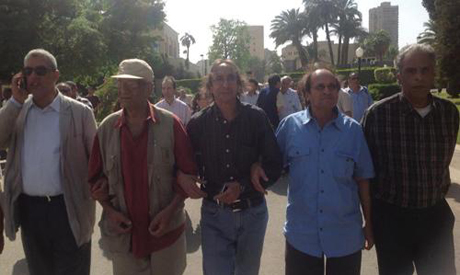
Artists march to Culture Ministry (Photo: Mohamed Saad)
After gathering more than 200 signatures from members of Egypt's cultural community opposed to last week's appointment of new culture minister Alaa Abdel-Aziz, artists and intellectuals have taken their opposition to the next level by organising a protest march.
On Tuesday, actors, filmmakers, theatre directors, musicians and singers, along with several university professors, gathered in front of the Hanager Centre – located on the grounds of the Cairo Opera House – and began marching towards the nearby culture minister's office in Zamalek.
The crowd included artists from all generations and fields, including filmmaker Amir Ramsis, film director Magdy Ahmed Ali, theatre director Ahmed Abdelhalim, conductor Nayer Nagui, opera singers Elhamy Amin and Dalia Farouk, violinist and music professor Osman El-Mahdy, journalist Saad Hagras, and professors from the Academy of Arts, along with many other artists and intellectuals.
The march set out at around 2:30pm towards the culture ministry, with participants chanting slogans against the new minister. Among the accusations levelled against Abdel-Aziz is the fact that he is a Muslim Brotherhood sympathiser. "We refuse the Brotherhood's influence on the culture sector," protesters shouted.
Tareq El-Naaman, head of the Central Administration for Committees and the People within Egypt's Supreme Culture Council, said that Egypt's cultural and intellectual community would fight the minister "to their last breath." He added that he expected Abdel-Aziz to dismiss several leading ministry officials in the coming period.
The protesters chanted against 'Brotherhood rule' in general, shouting: "Down, down with the rule of the Brotherhood's supreme guide."
"Appointing the minister is part of a thought-out plan to Brotherhoodise the culture ministry," film producer Mohamed El-Adl said. "Members of the cultural community will not accept the government's agenda that the minister is coming to execute; he is attempting to remove the leadership within the ministry, exactly like [President Morsi's November 2012] constitutional declaration."
As protestors marched, automobile drivers honked their horns in support of the protest.
On Monday, Academy of Arts Director Sameh Mahran hosted a conference on the academy's grounds at which he condemned the newly-appointed minister. The Egyptian Creativity Front has also demanded Abdel-Aziz' removal.
The same day, artists at the Cairo Opera House were angered by the new minister's alleged plans to remove Ines Abdel-Dayem from the post of opera chair. Although the ministry denied the allegations, artists remain worried that talk regarding Abdel-Dayem's removal remains underway inside the ministry.
The sense of insecurity and anger was topped by the artists' opposition to Muslim Brotherhood rule and the new minister's qualifications, which, they say, are not academically strong enough for him to hold Egypt's culture portfolio. They stress that Abdel-Aziz's contributions to Egyptian culture are largely unknown.
Abdel-Aziz, 52, graduated from the High Institute of Cinema in 1985. He obtained his Masters degree in postmodern philosophy in 2002 and his doctorate in cinema in 2008 from the same institution. He currently teaches at Egypt's High Institute of Cinema.
For much of his career, Abdel-Aziz worked in film editing and as assistant director for a number of short films produced by the High Institute of Cinema and the National Cinema Centre. As a film critic, he is also a member of the Egyptian Film Critics Association.
Abdel-Aziz was a member of the research team that worked on the eight-volume 'Encyclopaedia of Jews, Judaism and Zionism,' written by Egypt's late Abdel-Wahab El-Messiri, for which he provided input for the chapters related to Egyptian cinema.
Short link: